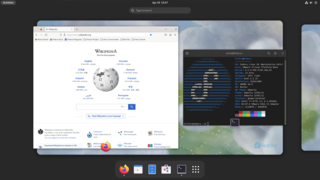
The Apache HTTP Server is a free and open-source cross-platform web server software, released under the terms of Apache License 2.0. Apache is developed and maintained by an open community of developers under the auspices of the Apache Software Foundation.
BIND is a suite of software for interacting with the Domain Name System (DNS). Its most prominent component, named, performs both of the main DNS server roles, acting as an authoritative name server for DNS zones and as a recursive resolver in the network. As of 2015, it is the most widely used domain name server software, and is the de facto standard on Unix-like operating systems. Also contained in the suite are various administration tools such as nsupdate and dig, and a DNS resolver interface library.

A Linux distribution is an operating system made from a software collection that includes the Linux kernel, and often a package management system. Linux users usually obtain their operating system by downloading one of the Linux distributions, which are available for a wide variety of systems ranging from embedded devices and personal computers to powerful supercomputers.

Solaris is a proprietary Unix operating system originally developed by Sun Microsystems. After the Sun acquisition by Oracle in 2010, it was renamed Oracle Solaris.

Mac OS X Server is a discontinued series of Unix-like server operating systems developed by Apple Inc. based on macOS. It provided server functionality and system administration tools, and tools to manage both macOS-based computers and iOS-based devices, network services such as a mail transfer agent, AFP and SMB servers, an LDAP server, and a domain name server, as well as server applications including a Web server, database, and calendar server.

Extensible Messaging and Presence Protocol is an open communication protocol designed for instant messaging (IM), presence information, and contact list maintenance. Based on XML, it enables the near-real-time exchange of structured data between two or more network entities. Designed to be extensible, the protocol offers a multitude of applications beyond traditional IM in the broader realm of message-oriented middleware, including signalling for VoIP, video, file transfer, gaming and other uses.

Apache Tomcat is a free and open-source implementation of the Jakarta Servlet, Jakarta Expression Language, and WebSocket technologies. It provides a "pure Java" HTTP web server environment in which Java code can also run. Thus it is a Java web application server, although not a full JEE application server.

Haiku is a free and open-source operating system capable of running applications written for the now-discontinued BeOS, which it is modeled after. Its development began in 2001, and the operating system became self-hosting in 2008. The first alpha release was made in September 2009, and the last was November 2012; the first beta was released in September 2018, followed by beta 2 in June 2020, then beta 3 in July 2021. The fourth beta was released on December 23, 2022, still keeping BeOS 5 compatibility in its x86 32-bit images, with a greatly increased number of modern drivers, GTK3 apps and Wine ported, as well as Xlib (X11) and Wayland compatibility layers.

Icecast is a streaming media project released as free software maintained by the Xiph.Org Foundation. It also refers specifically to the server program which is part of the project. Icecast was created in December 1998/January 1999 by Jack Moffitt and Barath Raghavan to provide an open-source audio streaming server that anyone could modify, use, and tinker with. Version 2, a ground-up rewrite aimed at multi-format support and scalability, was started in 2001 and released in January 2004.

Ubuntu is a Linux distribution based on Debian and composed mostly of free and open-source software. Ubuntu is officially released in three editions: Desktop, Server, and Core for Internet of things devices and robots. All of the editions can run on a computer alone, or in a virtual machine. Ubuntu is a popular operating system for cloud computing, with support for OpenStack. Ubuntu's default desktop changed back from the in-house Unity to GNOME after nearly 6.5 years in 2017 upon the release of version 17.10.
Technical variations of Linux distributions include support for different hardware devices and systems or software package configurations. Organizational differences may be motivated by historical reasons. Other criteria include security, including how quickly security upgrades are available; ease of package management; and number of packages available.

Skype for Business is an enterprise software application for instant messaging and videotelephony developed by Microsoft as part of the Microsoft Office suite. It is designed for use with the on-premises Skype for Business Server software, and a software as a service version offered as part of Microsoft 365. It supports text, audio, and video chat, and integrates with Microsoft Office components such as Exchange and SharePoint.
CVSNT is a version control system compatible with and originally based on Concurrent Versions System (CVS), but whereas that was popular in the open-source world, CVSNT included features designed for developers working on commercial software including support for Windows, Active Directory authentication, reserved branches/locking, per-file access control lists and Unicode filenames. Also included in CVSNT were various RCS tools updated to work with more recent compilers and compatible with CVSNT.

FreeBSD is a free and open-source Unix-like operating system descended from the Berkeley Software Distribution (BSD), which was based on Research Unix. The first version of FreeBSD was released in 1993. In 2005, FreeBSD was the most popular open-source BSD operating system, accounting for more than three-quarters of all installed and permissively licensed BSD systems.
SUSE Linux is a computer operating system developed by SUSE. It is built on top of the free and open source Linux kernel and is distributed with system and application software from other open source projects. SUSE Linux is of German origin, its name being an acronym of "Software und System-Entwicklung", and it was mainly developed in Europe. The first version appeared in early 1994, making SUSE one of the oldest existing commercial distributions. It is known for its YaST configuration tool.

Fedora Linux is a Linux distribution developed by the Fedora Project. It was originally developed as a continuation of the Red Hat Linux project. It contains software distributed under various free and open-source licenses and aims to be on the leading edge of open-source technologies. It is now the upstream source for Red Hat Enterprise Linux.
Nginx is a web server that can also be used as a reverse proxy, load balancer, mail proxy and HTTP cache. The software was created by Igor Sysoev and publicly released in 2004. Nginx is free and open-source software, released under the terms of the 2-clause BSD license. A large fraction of web servers use Nginx, often as a load balancer.

Apache James, a.k.a. Java Apache Mail Enterprise Server or some variation thereof, is an open source SMTP and POP3 mail transfer agent and NNTP news server written entirely in Java. James is maintained by contributors to the Apache Software Foundation, with initial contributions by Serge Knystautas. IMAP support has been added as of preview version 3.0-M2, which now requires Java 1.5 or later.

GNU Health is a free/libre health and hospital information system with strong focus on public health and social medicine. Its functionality includes management of electronic health records and laboratory information management system.
Jabber.org is a public, free instant messaging (IM) and presence service, based on XMPP, an open standard for IM.












